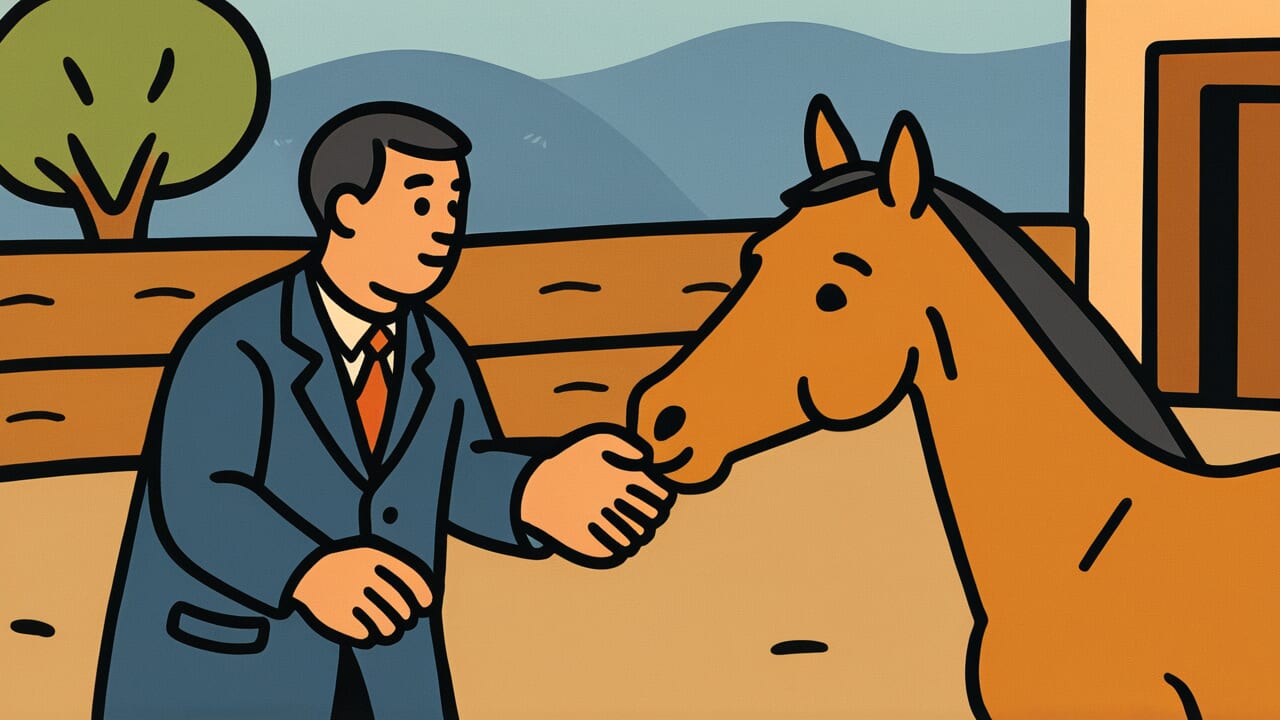How to Read “Don’t lend a horse without owning one”
Uma motazu ni uma kasu na
Meaning of “Don’t lend a horse without owning one”
“Don’t lend a horse without owning one” literally means you shouldn’t lend a horse to others if you don’t own one yourself.
The proverb warns against taking on responsibilities beyond your means. It cautions you not to make promises you can’t keep.
This saying applies when someone tries to make big commitments without the resources to back them up. It’s especially relevant when taking on responsibilities they can’t manage.
Common situations include becoming someone’s guarantor, borrowing money for investments, or giving advice without expertise. These actions can lead to irreversible consequences if things go wrong.
Today, this teaching remains important. It warns against taking on more than you can handle just to look good.
It also cautions against accepting important roles without proper preparation or qualifications. The proverb teaches you to assess your abilities honestly and act within your limits.
Origin and Etymology
No clear written records explain the origin of this proverb. However, the structure of the phrase reveals interesting background information.
Horses were extremely valuable and precious possessions in ancient Japan. They were essential for farming, transportation, and samurai warfare.
Owning a single horse represented significant economic power and responsibility. Raising horses required vast land, feed costs, and labor for care. Maintenance expenses were substantial.
The proverb likely emerged from this reality of horse ownership and management. Someone who doesn’t own a horse lending out a borrowed horse is dangerous.
They don’t know how to handle horses. They can’t deal with illness or injury. They can’t take responsibility if something goes wrong.
The expression points out the danger of acting as a middleman without substance. It likely spread among common people during the Edo period.
As commerce and lending became common in urban areas, it served as a warning against transactions without proper backing. The proverb condensed people’s life wisdom into a caution against promises and guarantees beyond one’s means.
Usage Examples
- Trying to become a guarantor for your friend’s company without experience is like “don’t lend a horse without owning one”
- Giving investment advice without certification is dangerous—it’s “don’t lend a horse without owning one”
Universal Wisdom
The proverb “Don’t lend a horse without owning one” contains deep insight about self-awareness and responsibility.
Everyone has a desire to appear bigger than they are, to be relied upon, to be useful. Out of goodwill or vanity, people make promises beyond their abilities.
It might feel good in the moment. But promises without substance eventually hurt not only yourself but also those who trusted you.
This proverb has been passed down through generations because this human tendency never changes. Recognizing your own limits is never easy.
In fact, overestimating your abilities is a natural human tendency. Our ancestors understood this human weakness.
They taught us that true sincerity lies in the courage to admit what you cannot do. You must calmly examine your abilities and distinguish between responsibilities you can and cannot handle.
This humility ultimately protects both yourself and those around you. Knowing your limits isn’t a passive attitude—it’s a sign of true responsibility.
When AI Hears This
Analyzing the situation of someone without a horse lending one through game theory reveals a surprising structure. This is a problem of “lack of commitment device.”
It means having no way to prove to the other party that you have the ability or will to seriously collect. Consider the borrower’s perspective.
If the lender owns a horse, you can assume “this person knows the value of horses and has means to recover it.” They know horse care methods, buying and selling routes, and market prices.
Most importantly, they have the urgency of “I’ll be in trouble if my horse gets hurt.” All these factors give credibility to the lender’s threat of “I’ll seriously pursue you if you don’t return it.”
However, when someone without a horse lends one, the borrower calculates differently. “This person has no horse management experience, so they can’t accurately assess damage or wear upon return.”
“They have no network or know-how for recovery. They might just be re-lending a horse they borrowed from someone else.” Information asymmetry makes the lender’s seriousness unmeasurable.
Game theory explains that players can only take trustworthy actions when they have a “mechanism that also causes them loss.” Owning a horse functions precisely as that “device that makes you feel pain too.”
Human society solves this problem through institutions like collateral and guarantors. But this proverb identified the same structure as human psychology before such institutions existed.
Lessons for Today
This proverb teaches you the value of knowing your limits.
In an era where everyone can be a broadcaster on social media, it’s tempting to make yourself look bigger. You give opinions on topics outside your expertise and offer advice in unfamiliar fields.
But real trust comes from honestly communicating what you can and cannot do. When someone asks for your help, pause before immediately saying “leave it to me.”
Can you truly take responsibility with your own abilities? Declining isn’t cold—it’s being honest for the other person’s sake.
Identify your areas of strength. You don’t need to excel at everything. Reliably fulfill responsibilities in areas where you can truly perform.
That accumulation builds genuine trust in you. Stop stretching yourself and wear clothes that fit your size.
This isn’t living small—it’s living authentically and sincerely. Your true-to-size self is most beautiful and strongest.



Comments